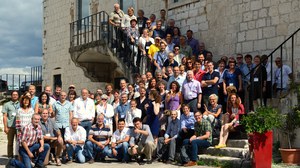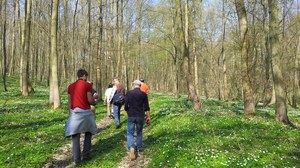Research
The research at the chair is conducted by an interdisciplinary team of economists, geo- and forestry scientists. The research focus is on biodiversity and ecosystem governance and the assessment of ecosystem services in order to better reflect nature conservation, biodiversity and ecosystem services in private and public decision-making.
The disciplinary focus is on economics, in particular public finance, ecological economics, environmental and institutional economics. We closely cooperate with ecologists, environmental and other social scientists, as well as environmental lawyers.
 © Ulf Molau
© Ulf Molau
Research at the chair
Assessing nature´s services for human well-being
Our research focuses on the analysis, assessment and development of different environmental policy instruments for biodiversity conservation and the sustainable provision of ecosystem services. A particular focus is on economic instruments in environmental and conservation policies. Since in political practice the conservation and sustainable use of biodiversity and ecosystem services is based on a large number of strategies and instruments, these economic instruments are to be analysed in the context of a policy mix with other instruments such as regulation, planning, but also voluntary instruments. Recent approaches to better integrate ecosystem services in decision-making relate to environmental-economic and business accounting. We work, for example, on the development and implementation of the ecosystem services concept in forestry management.
Ecological fiscal transfers
At the interface of public finance, environmental economics and ecology, a further research focus is devoted to the consideration of nature conservation, biodiversity and ecosystem services in intergovernmental fiscal transfers. Such transfers vertically distribute public revenues between jurisdictions at different governmental levels
(for example, between the national level and the states as well as between states and municipalities), and horizontally redistribute public revenues between higher-income and lower-income jurisdictions at the same level of government. Some decentralised governments, such as municipalities and federal states, provide above-average public functions for nature conservation reaching far beyond their own administrative boundaries, so-called spill-over benefits. Yet, there are only few examples of the successful integration of ecological indicators for the redistribution of tax revenues in intergovernmental fiscal relations. In our research on ecological fiscal transfers, we collaborate with international partners from Brazil, Portugal, France, Poland and Indonesia.
Science-policy interface: IPBES
Irene Ring has been involved in the following areas of the first work program of the Intergovernmental science-policy Platform on Biodiversity and Ecosystem Services (IPBES):
1) As a coordinating lead author of Chapter 6 on "Options for governance and decision-making across sectors and scales" of the IPBES Regional assessment (2018) on biodiversity and ecosystem services for Europe and Central Asia (ECA);
2) As a contributing author to Chapter 6 on "Options for decision-makers" of the IPBES Global assessment on biodiversity and ecosystem services (2019);
2) As an expert on policy support tools and methodologies.




